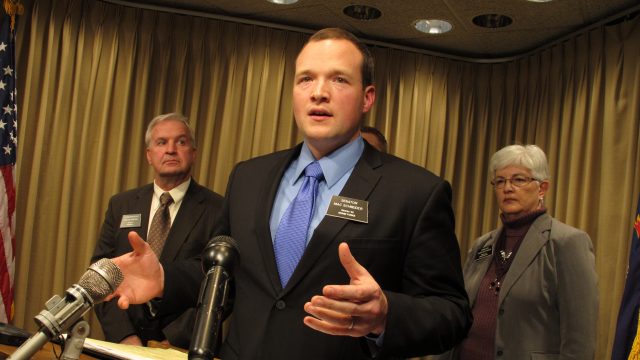North Dakota Democrats Think You’re Not Paying Enough in Taxes

The drift of North Dakota’s Democrats into political irrelevance often gets blamed on how far left their national party has gone. It’s hard to win elections in North Dakota when your fellow Democrats nationally are advancing (as one example) a federal regulatory regime which would be devastating for North Dakota’s primary industries.
But there is another problem Democrats face. It’s that they’re just flat-out wrong about North Dakota policy too.
Take, for instance, this op/ed in the Grand Forks Herald today from House and Senate Minority Leaders Kenton Onstad and Mac Schneider. In it the leaders accuse Republicans of making policy like drunken sailors during the heady days of North Dakota’s oil boom.
If they’d gone no further than that criticism, they’d be absolutely right. Republicans didn’t say “no” nearly often enough when the oil boom was driving record-setting levels of revenue into state coffers. Now that revenues have fallen back down to pre-oil boom levels – taxable sales and purchases for the first quarter of 2016 were just slightly higher than the 1st quarter of 2011 – the state is, indeed, suffering a hangover.
Yet it’s not the spending Onstad and Schneider are criticizing, despite the fact that general fund appropriations have nearly tripled over the last decade. Rather, their problem is that Republicans cut taxes:
During the boom, the majority’s governing philosophy might as well have been, “let the good times roll.” Cut the corporate income tax. Pop the champagne. Slash the oil extraction tax rate. Pour another. Drastically reduce the personal income tax, even though North Dakotans overwhelmingly said no to that choice in a statewide vote.
“We know better,” said the majority between toasts.
In this partisan fantasy world Schneider and Onstad have concocted North Dakota’s falling revenues are because Republicans let we citizens keep too much of our own money and not because commodity prices – particularly the price of oil – have tanked.
No, North Dakota doesn’t have a revenue problem. North Dakota has a spending problem. And it looks like this:

Not once in their op/ed do Onstad and Schneider mention this rapid growth in general fund appropriations. That omission speaks volumes.
What’s funny is that Onstad and Schneider acknowledge, obliquely and couched in the most sympathetic sort of rhetoric, that Democrats would have spent even more money if they’d been in charge.
“To be fair, Democratic-NPL legislators supported spending on key priorities, especially education and infrastructure,” they write. “But at the same time, we were focused on reducing and reforming the tax North Dakotans were upset about—property tax.”
[mks_pullquote align=”left” width=”300″ size=”24″ bg_color=”#ffffff” txt_color=”#000000″]zThis sorry state of affairs – where Republicans win elections because they’re somewhat less awful at spending than Democrats – is a big reason why Doug Burgum’s campaign against the Republican establishment was so successful.[/mks_pullquote]
For one thing Democrats – and Schneider, specifically – were on the Republicans’ left flank demanding more spending back when the oil boom revenues were rolling in. “You definitely want to have a budget cushion” Schneider told the Bismarck Tribune in 2013. “(But) I don’t think we need to fill our pockets with cash at the expense of addressing needs.”
It’s hard to swallow criticism of Republican spending from the guy who, not so long ago, was claiming that the state was putting too much in reserves and not spending enough.
For another, the Legislature trying to buy down property taxes is exacerbating the current budget headache. In the name of trying to reduce property taxes the state has now accumulated into the general fund hundreds of millions of dollars worth of obligations to local spending. And if the state tries to reduce any of that spending the likely impact will be higher property taxes.
It’s a catch-22, but Schneider and Onstad say we should have done even more.
I can say that it’s painful to defend Republican spendthrifts, but there’s simply no question that the state would be even worse fiscal shape had Democrats been in charge.
This sorry state of affairs – where Republicans win elections because they’re somewhat less awful at spending than Democrats – is a big reason why Doug Burgum’s campaign against the Republican establishment was so successful.
Democrats have been running against that Republican establishment for years and gotten nowhere. Mostly because of messaging like the above.
Burgum, meanwhile, runs as a fiscal conservative and mops the floor with an opponent in Attorney General Wayne Stenehjem who has been winning landslide elections on the statewide ballot for more than a decade.




